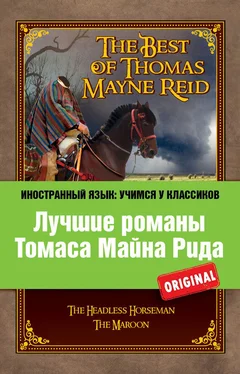“And you loved me then?” inquired he, only to enjoy the luxury of an affirmative answer. “You loved me then?”
“Oh, Herbert! how could I help loving you? Your eyes were so beautiful then!”
“What! Are they not so now?”
“How cruel to ask the question! Ah! far more beautiful now! Then I beheld them only with anticipation; now I look into them with the consciousness of possession. That moment was pleasure – this is ecstasy!”
The last word was perfectly appropriate – not a shade too strong to express the mutual feeling that existed between Herbert Vaughan and his cousin-wife. As their rounded arms became entwined, and their young bosoms pressed fondly together, both believed that even in this unhappy world ecstasy may exist.
Texas – a state in the South West of the USA (678,358 square kilometres); till 1836 Texas belonged to Mexico; after the independence from Mexico had been declared, the territory was included in the USA and became a state in 1845
savannah – a plain with grass and no trees
prairie – a level treeless land covered with grass
the Leona – the river in Texas, USA
serape – a bright, coloured Mexican shawl or plaid
cicada – a flying insect which produces a shrill sound in hot, dry weather
nimbus – a light or golden circle round the saint’s head; a rain cloud
azure – ( poet .) bright blue (usually about the sky)
centaurean – from centaur – in Greek mythology, a strange creature, half man and half horse
San Antonio de Bejar – the city in south-central Texas; it was founded by the Spanish expedition from Mexico in 1718
Osnaburgh – a linen cloth of a certain trademark
Pittsburgh – the city in Pennsylvania on the Monongahela River; the first settlement was founded in 1758
Kentucky – the state in the south of the United States (104,664 square kilometres); it was admitted as the 15 thstate in 1792
Jehu – the King of Israel (842–815 BC) who was a great chariot driver
Indianola – the city in central Iowa founded in 1849; there used to be a town of the same name in Texas
the Gulf of Matagorda – the Bay of Matagorda, an inlet of the Gulf of Mexico in southern Texas
en route– on the way to/from ( French )
cortège – a procession ( French )
nankin – a kind of rich cloth
A Leghorn hatis a hat made of straw imported from Livorno, a town in Italy
A Panama hatis a light hat made of plaited palm leaves; the name comes from Panama , a Spanish-speaking republic in Central America
entourage – people accompanying a respected or high-ranking person
carriole – a light, covered carriage drawn by one horse
a Jersey wagon – a light two-wheeled carriage
a barouche – a four-wheeled carriage for four passengers and the driver, with two seats facing each other
the Mississippi – the largest river in North America; it flows south to the Gulf of Mexico. Together with its tributary, the Missouri River, the Mississippi is the longest river in the world
Louisiana – the US state (123,366 square kilometres) admitted to the union in 1812 as the 18 thmember; it borders Arkansas, Mississippi and Texas
a Creole– in the old French or Spanish states in the south of the USA, a person of pure European or mixed European origin; descendants of the French and Spanish settlers
penates– home, household; in Roman mythology, Penates were household gods who protected the house
Erebus – in Greek mythology, Erebus (Darkness) is the offspring of Chaos (the Greek for Abyss )
gramineae– grass
algarobias – a kind of wood species
mezquites – a name of a bush with thorns
Fort Inge – a settlement built in 1849 on the eastern bank of the Leona River, 135 kilometres south-west of San Antonio
lazo– lasso – a long rope used for catching horses and cattle
ranchero– rancher ( Spanish )
calzoneros– trousers ( Spanish )
calzoncillos– men’s underwear ( Spanish )
botas– boots ( Spanish )
Moorish – related to the Moors, a population of medieval Spain and Portugal of Moroccan, Algerian or Berber origin; the Moorish style is typical for architecture and decorative art of medieval Spain
the Conquistadores – participants of the Spanish conquest of America in the 16 thcentury
cavallero – a nobleman; originally: a cavalry man, a military man on horseback
mustangs – North American wild horses; they descended from Spanish horses brought to America in the 16 thcentury. Tamed mustangs are known for their speed and strength
a Jack – a common man, a plebeian
a tête-à-tête – a private meeting of two persons
piccaninny – (US) a small child; an African baby
Lucifer – in Greek and Roman mythology, the Lightbearer – the morning star, symbol of dawn; in Christianity, the name of Satan before his fall
Tartarus – in Greek mythology, the deepest part of the underworld
Pluto – in Greek mythology and religion, the son of Cronus, and brother of Zeus; he ruled the underworld, the dark land of the dead
Proserpineor Persephone – in Greek mythology and religion, the wife of Pluto, king of the underworld
Читать дальше
Конец ознакомительного отрывка
Купить книгу












